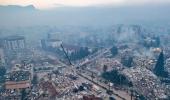The two major earthquakes, which devastated a huge area in south-eastern Turkey and a part of Syria last Monday, killing more than 29,605 people in Turkey and 4,574 in Syria, wounding tens of thousands and leaving a huge but unknown number of missing persons have upended the election plans of Turkish President Recep Tayyip Erdogan.

For the first time in 20 years, Erdogan's political future is really on the line.
He must now prove that he is a leader who can get things done and can mobilise effectively the machine of the state to provide relief to the affected people and help them rebuild their homes and their lives.
The two major earthquakes at magnitudes of 7.7 and 7.6 caused the collapse like a house of cards of many thousands of residential and public buildings as well as hotels and hospitals in 10 provinces, affecting more than 7.6 million people.
Martin Griffiths, the UN Emergency Relief Coordinator, said he expects the death toll to at least double.
Many Turks are very angry with the government because after the destructive earthquake of 1999 (which killed about 17,000 people) legislation was enacted providing that all new buildings must comply with strict seismic building codes.
However, the enforcement of the legislation by the local authorities was quite lax and many contractors were using inferior materials and kept constructing unsafe buildings, ignoring the relevant specifications.
What is more, the government had imposed a special tax supposedly aimed at reinforcing existing buildings against earthquakes.
Although more than $17 billion had been collected, there are claims that only a portion of this money was actually used for the stated purpose of seismic protection, while most of the money was spent for other purposes.
The AKP also granted a controversial amnesty for illegal construction, which brought a lot of money to government coffers, while the construction companies Erdogan has always favoured made savings of billions, but failed to protect residents from earthquakes.
President Erdogan tried to calm the anger of earthquake victims saying that 'Such things always happened. It's part of destiny's plan'.
He promised immediate aid of about $530 to each homeless family and promised, unrealistically, that within a year the Housing Ministry will build new homes for everyone who became homeless from the earthquake.
Such a thing, however, would require trillions of Turkish Lira and cannot be completed in such a short time.
Erdogan admitted that the response of rescue services to the earthquake victims was less than perfect and promised that 'those responsible for the failures will be called to account'.
On Saturday President Erdogan said that the government will take action against individuals who have engaged in looting and other criminal activities in the region affected by the earthquakes.
Earthquake victims, who for days were left without food and shelter, on Feb. 10 booed Justice Minister Bekir Bozdag in the Yenisehir district in the province of Diyarbakir, when he visited the site of collapsed buildings.
Kemal Kilicdaroglu, leader of the opposition Republican People's Party (CHP), strongly criticised Erdogan's AKP government for the huge destruction caused by last week's earthquakes, saying that it was the result of government corruption in the construction sector and the fact that authorities deliberately avoided to supervise contractors and make them apply the building standards.
Kilicdaroglu said Erdogan's government has not 'prepared the country for the earthquakes' despite being in power for over 20 years, and added: "That is why I am never thinking of meeting with Erdogan. I don't ever see this issue (destruction caused by the earthquake) as something beyond politics. We have come to this point because of his politics. People have been paying earthquake taxes to the state all their lives, but are unable to see that state once they need it. All exist for the (Presidential) Palace. Whenever he takes this country down, he makes calls of 'Stand by me.' I would have nothing to do with him and will never have."
According to press reports, 113 arrest warrants have been issued in connection with the construction of buildings that collapsed, including contractors and architects, and 12 persons are already in custody.
Many Turks see these actions as a desperate attempt on the part of the AKP Government -- which actively encouraged massive construction of shoddy buildings in seismic-prone areas and turned a blind eye to violations of building codes -- to divert blame on building contractors and architects.
The earthquakes have put President Erdogan in a tight spot.
A few days ago, he moved the elections from June to May, but now he will be probably forced to seek to extend the holding of elections for a few months, hoping that with the passage of time, the anger of the people will subside and he could present himself once again as the capable leader who can face successfully any difficult situation.
But to achieve this he must show tangible results and not resort to empty rhetoric.
Meanwhile, he declared a state of emergency in the 10 quake-stricken provinces allegedly to help the state to intervene against reported looting.
But the real aim could be that Erdogan wants to control the distribution of aid so as to present foreign aid send to Turkey as aid coming from his government and to prevent unfavourable reporting about the terrible situation in the area, where people are still deprived of food and shelter, and complain about the painfully slow response of rescue teams.
As Haaretz's Middle East affairs expert Zvi Bar'el points out: "From now on, great efforts will be made not just to extricate the dead and wounded, but also to create a narrative, with a counter-narrative constructed by the opposition. The earthquake has become an unexpected political player, holding the potential to significantly alter the structure of the regime, or, alternatively, to consolidate even further the scope of Erdogan and his party's rule."










